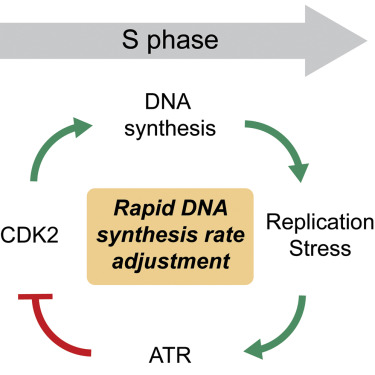Cell Systems ( IF 9.0 ) Pub Date : 2018-06-13 , DOI: 10.1016/j.cels.2018.05.011 Leighton H. Daigh , Chad Liu , Mingyu Chung , Karlene A. Cimprich , Tobias Meyer

|
Faithful DNA replication is challenged by stalling of replication forks during S phase. Replication stress is further increased in cancer cells or in response to genotoxic insults. Using live single-cell image analysis, we found that CDK2 activity fluctuates throughout an unperturbed S phase. We show that CDK2 fluctuations result from transient ATR signals triggered by stochastic replication stress events. In turn, fluctuating endogenous CDK2 activity causes corresponding decreases and increases in DNA synthesis rates, linking changes in stochastic replication stress to fluctuating global DNA replication rates throughout S phase. Moreover, cells that re-enter the cell cycle after mitogen stimulation have increased CDK2 fluctuations and prolonged S phase resulting from increased replication stress-induced CDK2 suppression. Thus, our study reveals a dynamic control principle for DNA replication whereby CDK2 activity is suppressed and fluctuates throughout S phase to continually adjust global DNA synthesis rates in response to recurring stochastic replication stress events.
中文翻译:

随机内源性复制应力导致CDK2活动中的ATR触发波动,从而动态调节总体DNA合成速率
忠实的DNA复制受到S阶段复制叉停顿的挑战。在癌细胞中或对遗传毒性侮辱作出反应时,复制压力会进一步增加。使用实时单细胞图像分析,我们发现CDK2活性在不受干扰的S期中波动。我们表明,CDK2波动是由随机复制压力事件触发的瞬时ATR信号引起的。反过来,波动的内源性CDK2活性会引起DNA合成速率的相应降低和增加,从而将随机复制压力的变化与整个S期的整体DNA复制速率的波动联系起来。而且,在有丝分裂原刺激后重新进入细胞周期的细胞由于复制应激诱导的CDK2抑制作用增加而导致CDK2波动增加和S期延长。因此,































 京公网安备 11010802027423号
京公网安备 11010802027423号